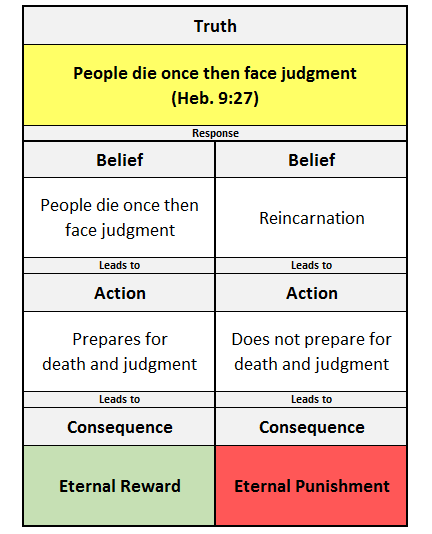 “What is truth?”
“What is truth?”
That’s the question a Roman governor asked a Jewish man 2,000 years ago. And it’s the question I asked myself while sitting alone in a church pew.
Like the Roman governor, I too stared truth in the face; but at that point, I didn’t recognize it.
I was 20 years old then—14 years a believer. I grew up in church, I went to Christian schools, and I could recite the books of the Bible in order. But even then, I didn’t get it.
Christianity was a cultural thing to me. It was as normal as my dad, the worship leader, playing Kirk Franklin, Fred Hammond, and the Winans siblings in the car. (Yes, I’m black.)
Sure, my faith was genuine, but in a way, it almost felt…too easy. I was born into it. I didn’t discover it.
Other people were so happy to talk about Jesus and the things God did for them, but I could never relate. I knew the Bible better as a kid than many adult believers, yet still, I was jealous of them.
I longed for what they had. I wanted the peace, joy, and gratefulness that oozed from everyone else.
So you know what I did? I asked.
I already knew facts but I didn’t understand them. So I asked God to help, and that’s when things changed.
No, an angel didn’t visit me or anything, but there was a difference within.
I had this newfound desire to read the Bible, and I couldn’t explain why. There was a hunger for its words—a craving of sorts. I didn’t just want the Bible; I needed it.
I used to nod off in church all the time before, but then, sermons became a highlight—not just because I wanted to hear the Word, but because that was my chance to compare.
The kid who barely kept his eyes open before now observed preachers with a sharp-eyed gaze. I compared their words to what I learned on my own. I noticed when they misinterpreted or only gave opinions, then I read more later to confirm I was right.
That’s when I started to get it. I understood the words I could only recite before. I had finally wrapped my head around the Bible, but more importantly, I saw its words come alive.
Every day I had a “there’s-a-verse-on-that” moment. And for the first time in my life, I saw the faith for what it always was:
Truth.
Responding to Truth
 So why was my discovery important?
So why was my discovery important?
It was important because truth is always present—regardless of what you believe.
Truth doesn’t care how you feel about it, it doesn’t care what the majority thinks, and it doesn’t care about fads and trends…
Truth is just the way things are.
Take the law of gravity for example. Gravity doesn’t care if you hate it. There’s nothing you can do to change it, and it treats you and your friend the same way.
Gravity pulls everyone down at a constant rate all the time. And since you know gravity exists, you respond in the appropriate manner.
You believe gravity is real so you avoid the edge of a cliff. And this action keeps you safe.
But what if you didn’t believe in gravity?
Well, things would be different.
If you didn’t believe in gravity, your behavior would also change. Instead of avoiding the cliff, you’d run to it. You’d act reckless and maybe jump off to fly.
But guess what?
Gravity would still exist. And you’d have the bruises to prove it.

In both cases here, you responded to truth with belief. Your belief led to an action, and that action had a consequence. But notice how the truth in both cases, gravity, never changed.
The first difference occurred at belief. Everything else just followed behind.
The Importance of Doctrine
 What comes to mind when you hear the word “doctrine”?
What comes to mind when you hear the word “doctrine”?
Is it a picture of old men studying fables in a monastery? Is it dry and heartless tradition that’s long since been irrelevant?
Those ideas are what most people envision when they hear the word. But contrary to what stereotypes suggest, doctrine isn’t about tradition, old age, or boredom…
A doctrine is simply a belief.
The biblical word basically means “teaching” or “instruction”, and it usually has a lifestyle application.
Sound familiar?
Your belief about gravity is essentially a doctrine. That belief can be true or false, but only a true one leads to good in the end.
This is why theology is so important. The Bible doesn’t present itself as a mere collection of stories, rituals, and tips for a better life. It presents itself as unchanging, eternal truth.
The apostle Paul wrote that “all scripture is breathed out by God” (2 Tim. 3:16 ESV), and the author of Hebrews wrote “it is impossible for God to lie” (Heb. 6:18; cf. Num. 23:19, Titus 1:2). So clearly the Bible claims its words are true (Ps. 119:160, John 17:17).
Determining the accuracy of that claim is beyond the scope of this article, but for my purposes here, we’ll assume the claim is true. And if the Bible is truth like gravity, we need to align our belief, or doctrine, with its message.
Correct beliefs about reality lead to good results in the end. That’s why Paul told Timothy to “Take heed to yourself and to the doctrine. Continue in them, for in doing this you will save both yourself and those who hear you” (1 Tim. 4:16).
If we accept sound doctrine and guard our minds, we’ll “no longer be children, tossed to and fro by the waves and carried about by every wind of doctrine, by human cunning, by craftiness in deceitful schemes.” (Eph. 4:14 ESV)
Many modern churches, however, completely ignore Paul’s command. They shun biblical doctrine because they think it’s divisive; but the Bible tells us that not teaching sound doctrine is what really divides.
Ephesians 4:13 says that “unity of the faith” is our goal, but how can we unite if we all believe different things?
Paul warned believers “to watch out for those who cause divisions and create obstacles contrary to the doctrine that you have been taught; avoid them. For such persons do not serve our Lord Christ, but their own appetites, and by smooth talk and flattery they deceive the hearts of the naive. (Rom. 16:17-18 ESV).
The only way to avoid this confusion is to know and speak the truth. That’s why we’re told to “Preach the word! Be ready in season and out of season. Convince, rebuke, exhort, with all longsuffering” (2 Tim. 4:2). But our refusal to do this has let the Bible’s prediction come true:
For the time will come when people will not put up with sound doctrine. Instead, to suit their own desires, they will gather around them a great number of teachers to say what their itching ears want to hear. They will turn their ears away from the truth and turn aside to myths. (2 Tim. 4:3-4 NIV)
And we’re seeing the effects of this time right now.
Consequences of Belief

For a world so obsessed with reason and logic, you’d think we’d have a better understanding of truth.
Our world says that you have a truth and I have a truth, but really, we’ll never know which is right. Besides, my truth may not be nice or welcoming, and if that’s the case, we should reject it.
But just like the person who ignores gravity, we forget that truth judges us, not the other way around.
We’ve essentially said that gravity doesn’t exist and that two plus two equals five. We’ve raised belief to the status of truth and ignored the consequence. But guess what? Truth doesn’t care about your belief.
Truth says you’ll fall because of gravity and you’ll fail math by giving wrong answers.
Your beliefs always have a consequence. And in the case of biblical truth, that consequence is too great to ignore.
A believer in reincarnation, for example, will act much different than a believer of the Bible. Reincarnation says you’ll come back to life in some form after death, but the Bible says “people are destined to die once, and after that to face judgment” (Heb. 9:27 NIV).
The one who believes in reincarnation is more likely to form a care-free attitude. He won’t value morals, purpose, or life in general as much because he thinks the cycle continues without judgment.
In contrast, the person with a biblical worldview will value morals, purpose, and human life much more. His belief in the finality of death will make him cherish every moment of life. And his belief in judgment afterwards should prevent an immoral lifestyle.
From society’s standpoint, neither person is particularly bad. The reincarnation believer may have looser morals, but even still, both should coexist.
The problem occurs, however, when it’s time for truth to judge.
If we still assume the Bible’s message is true, then the consequence of false belief is devastating. The man who believed the Bible had a correct belief (Matt. 7:24-25). But the believer in reincarnation faces serious trouble (Matt. 7:26-27).
The latter didn’t live in preparation for death and judgment. So when he does pass away, he’ll face a negative eternal consequence—and that’s a very long time to be wrong.

It might seem hurtful or insensitive to denounce his belief, but when you view his life in light of eternity and the truth, correcting him is the most loving thing to do (James 5:19-20).
This is why pastors and teachers are so important.
Good pastors don’t simply condemn an action because it leads to a bad life. They condemn that action because it’s “contrary to sound doctrine” (see 1 Tim. 1:9-10). Or in other words, they condemn it because it stems from a false belief.
The apostle John alluded to this when he wrote, “If we say that we have fellowship with [God], and walk in darkness, we lie and do not practice the truth.” (1 John 1:6, emphasis added)
Morality is not a social construct we define by feelings or pragmatism; morality is a constant that’s defined by truth.
If rape, murder, and fornication aligned with truth, they would all be moral actions. But since they don’t, and never will, those actions should be condemned.
The only reason feelings can guide us to moral action is because “God’s law is written in [our] hearts” (Rom. 2:15 NLT). He designed us with an innate sense of morality, but for reasons I’ll explain later, those feelings can’t always be trusted.
Let’s Review
To sum up everything so far, we’re concerned with four things:
- Truth
- Belief
- Actions
- Consequences
Truth is a constant that’s always present—regardless of what you believe.
The law of gravity is an example of truth. And the Bible claims to be truth too.
Belief is your response to truth. Your belief is correct if it aligns with truth and false if it contradicts it. You can believe in gravity or deny it, for example, but gravity still exists either way.
The word “doctrine” refers to teaching or instruction, and it’s the biblical equivalent of a belief.
Actions follow belief. Good actions stem from true beliefs, and bad actions stem from false ones.
People who wisely avoid the edge of a cliff prove their belief in gravity. Likewise, those who display good character prove their belief in biblical truth (see James 2:17).
Consequences result when truth judges action—an event that may or may not occur immediately. Good actions lead to good consequences, while bad actions lead to bad ones.
Injury is the consequence of acting reckless near a cliff’s edge. Spiritual weakness, increased immorality, and divine punishment are consequences of ungodly behavior (Rom. 2:8-9, 1 Cor. 6:9-10 ESV).
As you can see, everything hinges on your response to truth (aka your belief).
The ideas you accept have real consequences, and this is why good doctrine are so important.
The Enemies of Truth
Finally, I need to cover truth’s enemies.
Discovering truth itself is already difficult, but the Bible presents three parties that actively work to oppose it.
Here I’ll describe who and what those enemies are:
Enemy #1: Satan
 The first and most notorious enemy is Satan himself. The problem is, most people don’t see him as an enemy—at least not in the way the Bible presents him.
The first and most notorious enemy is Satan himself. The problem is, most people don’t see him as an enemy—at least not in the way the Bible presents him.
People think he’s a pitchfork-wielding creature torturing sinners in hell, but that’s not true.
For one, the devil isn’t in hell. He hunts the living, not the dead (1 Peter 5:8). And second, he doesn’t just do unpleasant things.
It’s popular to believe that health, wealth, and blessing are always from God while sickness, poverty, and misfortune are used only by Satan. But this is an oversimplified and inaccurate view of what Scripture says.
Satan is an enemy of truth, not materialism. He would gladly give you the world if it cost you your soul (see Mark 8:36). In fact, that’s exactly how he tempted Jesus (Matt. 4:8-9).
From an earthly perspective, Satan gives plenty of “good” things—that’s what makes him so dangerous. He’s a master manipulator who uses your own desires against you—all while making you think you’re doing good (see Gen. 3:4-6).
The devil presents himself as an angel of light (2 Cor. 11:14 NASB), but really, he’s an accuser, a slanderer, and the father of lies (see John 8:44).
Satan hates you and the truth so much that he’ll give you a pleasurable life now if it means you’ll suffer for eternity.
No, his power is nothing compared to God (see Luke 10:18), but that doesn’t mean he’s weak either. He’s an intelligent and personal influence for evil. So it’s important that we don’t underestimate him.
Satan and his fallen angels are the unseen force behind much evil in human history. And if you watch the news today, you’ll see that he’s still active.
The good news, however, is that Jesus already beat him (Heb. 2:14 NIV). And if we stand firm in the truth, there’s not much the liar can do (1 John 4:4, James 4:7).
Enemy #2: The World
Do not love the world or the things in the world. If anyone loves the world, the love of the Father is not in him. For all that is in the world—the desires of the flesh and the desires of the eyes and pride of life—is not from the Father but is from the world. (1 John 2:15-16 ESV)
The Bible calls Satan a “ruler” and a “prince” many times, but what exactly does he rule over?
Like I said earlier, it’s not hell. So where is his kingdom?
Well, just look around you.
The world is the devil’s playground. The Bible even calls him “the god of this world” (2 Cor. 4:4 NLT).
Satan’s kingdom is right here on earth, and he uses his influence to shape it the way he wants.
Whenever the Bible refers to “the world” this way, it’s referring to the system of values, lifestyles, and philosophies that opposes God. That’s why James wrote that “anyone who chooses to be a friend of the world becomes an enemy of God” (James 4:4 NIV).
The Bible encourages us to know the truth and allow it to change our lives, but the world suppresses truth and tempts us to act in ways God hates (Rom. 1:18).
Music, pornography, Hollywood, they’re all used to promote godless lifestyles. And the overwhelming presence of these tools can easily mold entire cultures. That’s not to say every tool is inherently bad, but more often than not, each is used for destructive means.
This is why the Christian life is so difficult. We live in a world that constantly says truth is wrong. We’re told that sex, money, and power are all that matters. Life is survival of the fittest, and if you’re not on top, you’re clearly wrong.

Worldly influence is what makes Satan so powerful. He’s not omnipresent like God—that is, he can’t be in more than one place at a time—but he and his fallen angels control a system whose reach is endless.
Many unbelievers are even aware of this system, but they misjudge the ultimate force behind it. They blame white people, or Jews, or whoever else they don’t like, but this only adds to the world’s pile of hate.
People are not the enemy. The system and its ruler are the enemies:
[O]ur struggle is not against flesh and blood, but against the rulers, against the powers, against the world forces of this darkness, against the spiritual forces of wickedness in the heavenly places.(Eph. 6:12 NIV)
Instead of looking for people to blame, the Bible tells us to deny the system and live in light of the truth. We’re told to “not conform to the pattern of this world, but be transformed by the renewing of your mind.” (Rom. 12:2 NIV)
We renew our minds by reading Scripture and believing it’s truth. We remind ourselves of who God is and how He wants us to live. And when we get discouraged, we look to Jesus who said, “take heart! I have overcome the world.” (John 16:33 NIV; cf. Col. 2:15 NLT)
Enemy #3: Sin
The last enemy is sin.
Most people only think of sin as an action—it’s a mistake, crime, or some evil behavior—but that’s an incomplete view of what sin is.
Sin isn’t just an action. Rather, it’s the cause of those actions.
Sin is better defined as a spiritual disease (Rom. 5:12, Jer. 17:9 NASB). It’s a deficiency that inclines us toward immorality and leads to both physical and spiritual death (Rom. 6:24).
The sin nature affects people of all skin colors, genders, and social standings. It’s the reason why we all “fall short” (Rom. 3:23) and that “there is no one who does good” (Rom. 3:12 NIV). Sin affects us all whether we acknowledge it or not—and we deceive ourselves if we don’t (1 John 1:8).
When people lie or steal, they don’t just choose to do wrong; they display symptoms of this larger condition.
If you have a cough for example, it’s a sign that you’re ill. And the more you cough uncontrollably, the more serious the illness is.
Now imagine a world where everyone coughs, all the time. Sure, some people cough more than others—much more so in fact—but you still have evidence that everyone in the world is sick.
You don’t have to imagine long, because this is the world we live in. We just sin instead of coughing (Mark 7:21-23).

Our sin nature—that is, our natural inclination to sin—is one of the most deceitful enemies of truth.
Yeah, Satan and the world are great enemies, but both of them are external. Sin on the other hand, is always present within (Rom. 7:18, Rom. 7:20), and there is no way to treat it yourself.
Sin affects our hearts so we do evil without remorse (Eph. 4:18-19 ESV), our minds so we can’t grasp spiritual truth (1 Cor. 2:14), and our bodies so we desire the unnatural (Rom. 1:24 NIV). But the good news is, there’s hope.
Jesus already addressed our sin (Rom. 5:8). And if we trust in His sacrifice, we gain spiritual freedom (Rom. 8:2, John 8:36). Yes, we still keep our sin nature and struggle against it, but God gives us a new nature—one that isn’t bound by sin and susceptible to the world’s lies (2 Cor. 5:17).
Our hearts are softened, our minds are enlightened, and we produce external symptoms of a renewed spirit (Gal. 5:22-23).
Believers are also promised a new sinless body for eternity (Phil. 3:20-21, 1 John 3:2, 1 Cor. 15:53). And when we get that body, we’ll see what we were supposed to be all along (Rom. 8:29).
So to review, there are three enemies who fight the truth.
We have an ultimate enemy (Satan) who influences a system (the world) to keep us all sick (in sin).
But fortunately, God provided a way out. He sent truth incarnate (Jesus), a system of truth (the Bible), and the Spirit of truth (the Holy Spirit) to promote spiritual health.
And if we accept the gifts God has freely given, no enemy will be victorious.
Do You Want to Be Free?

Then you will know the truth, and the truth will set you free. (John 8:32 NIV)
Now it’s all up to you.
Truth will always be there, and I’ll do my best to spread it, but the choice to believe lies solely with you.
So will you accept the truth like I did? Or will you stay right where you’re at?
That’s a decision for you to make.
But since I have your attention now, I’ll go ahead and let you know:
Freedom feels pretty good.
-Drew
Photo Credits (By Order of Appearance):
- Nathaniel Shuman on Unsplash
- Zoltan Fekeshazy on Unsplash
- RU Recovery Ministries on Unsplash
- Ben White on Unsplash
- Museums Victoria on Unsplash
- pawel szvmanski on Unsplash
- Pim Myten on Unsplash
- Gift Habeshaw on Unsplash
God’s wisdom on you bro.
Every gift I have is from Him and for Him.